H6278
4-Hydroxytamoxifen
≥98% (HPLC), powder, Tamoxifen metabolite
Synonym(s):
4-(1-[4-(Dimethylaminoethoxy)phenyl]-2-phenyl-1-butenyl)phenol, 4-OHT, cis/trans-4-Hydroxytamoxifen
About This Item
Recommended Products
product name
4-Hydroxytamoxifen, ≥70% Z isomer (remainder primarily E-isomer)
Quality Level
Assay
≥98% (HPLC)
form
powder
storage condition
desiccated
protect from light
solubility
methanol: 10 mg/mL
ethanol: 20 mg/mL (with heating)
antibiotic activity spectrum
neoplastics
Mode of action
enzyme | inhibits
originator
AstraZeneca
storage temp.
2-8°C
SMILES string
CC\C(c1ccccc1)=C(/c2ccc(O)cc2)c3ccc(OCCN(C)C)cc3.CC\C(c4ccccc4)=C(\c5ccc(O)cc5)c6ccc(OCCN(C)C)cc6
InChI
1S/2C26H29NO2/c2*1-4-25(20-8-6-5-7-9-20)26(21-10-14-23(28)15-11-21)22-12-16-24(17-13-22)29-19-18-27(2)3/h2*5-17,28H,4,18-19H2,1-3H3/b26-25+;26-25-
InChI key
ZJLDABGSDWXVGE-BDSXMVAQSA-N
Gene Information
human ... ESR1(2099) , ESR2(2100) , ESRRG(2104) , IL6(3569)
rat ... Ar(24208) , Esr1(24890) , Esr2(25149)
Looking for similar products? Visit Product Comparison Guide
General description
4-OHT effectively inhibited cell growth in the absence of estrogen when cell proliferation was stimulated by insulin or epidermal growth factor. 4-OHT inhibits lipid peroxidation within cell membranes and shows peroxyl radical scavenging activity.
Application
- to induce the recombination of small intestinal organoids.
- to study its impact on the ability of human peripheral blood mononuclear cells (PMNCs) to form hematopoietic colonies.
- to induce overexpression of MYCN in the neuroblastoma cell line to determine how the elevated MYCN expression influences the sensitivity of neuroblastoma cells to BIRC5/survivin inhibitor, YM155-induced apoptosis.
Biochem/physiol Actions
Features and Benefits
Signal Word
Warning
Hazard Statements
Precautionary Statements
Hazard Classifications
Acute Tox. 4 Dermal - Acute Tox. 4 Inhalation - Acute Tox. 4 Oral - Eye Irrit. 2 - Repr. 2 - Skin Irrit. 2
Storage Class Code
11 - Combustible Solids
WGK
WGK 3
Flash Point(F)
Not applicable
Flash Point(C)
Not applicable
Personal Protective Equipment
Certificates of Analysis (COA)
Search for Certificates of Analysis (COA) by entering the products Lot/Batch Number. Lot and Batch Numbers can be found on a product’s label following the words ‘Lot’ or ‘Batch’.
Already Own This Product?
Find documentation for the products that you have recently purchased in the Document Library.
Customers Also Viewed
Articles
We presents an article on Autophagy in Cancer Promotes Therapeutic Resistance
Our team of scientists has experience in all areas of research including Life Science, Material Science, Chemical Synthesis, Chromatography, Analytical and many others.
Contact Technical Service












